Pittsburgh Opera’s ‘The Flying Dutchman’ Soars with Great Talent
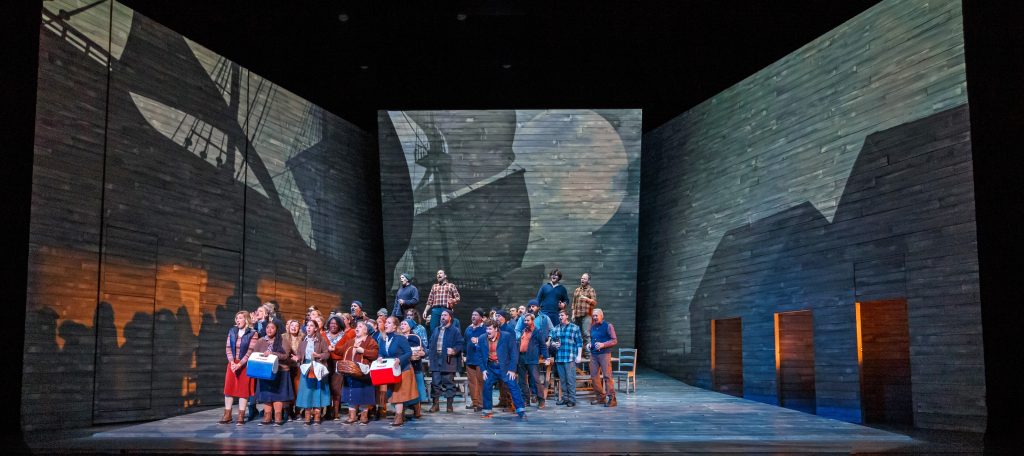
The villagers, overshadowed by the Dutchman’s ship in port, assemble to celebrate a faithful marriage.
To understand one of the many merits Richard Wagner earned in his career as a composer of more than a dozen operas, a simplistic snapshot of the history of theater helps distinguish his early work. The Flying Dutchman or Der Fliegende Hollander, Pittsburgh Opera’s current offering at the Benedum Center, was last performed in Pittsburgh 20 years ago. At least, compared to other great operatic stories, there may have been a reason for the long wait. It’s not easy to recreate a masted ghost ship to dock on stage. But that reason has nothing to do with Wagner’s sweeping musical composition which elegantly, powerfully and dramatically places his audience on a precipice overlooking the raging Nordic Sea.
By 1800, albeit born from French Theater, the ideal dramatic plot had transformed from melodrama to the “well-made play.” The story of a melodrama unravels when a hero is cheated by a villain who in turn is defeated (or vanquished) with love (or valor) always stronger than treachery. It’s every plot that Jeanette McDonald and Nelson Eddy sang in their early “talkies” or that Dudley Do-Right, sweetheart Nell, and Snidely Whiplash clown around in more modern cartoons. The “well-made play” improved that formula. Still, there was a good guy and a bad guy, and at least one love interest, but added to the plot was a higher power––or a powerful secret––of which only the audience was made aware. Otherwise known as “dramatic irony,” the “well-made play” included this engaging pretense that the audience was smarter than either the hero or the villain. When a god would descend to end the conflict—or the missing letter was revealed to prove the truth––the story concluded with a major climax. Wagner’s idea for his tale about a lovesick captain doomed to sail the seven seas until he finds a faithful bride straddles these dramatic story structures. It’s pure melodrama but with a surprising climax.
Symphony and The Sea
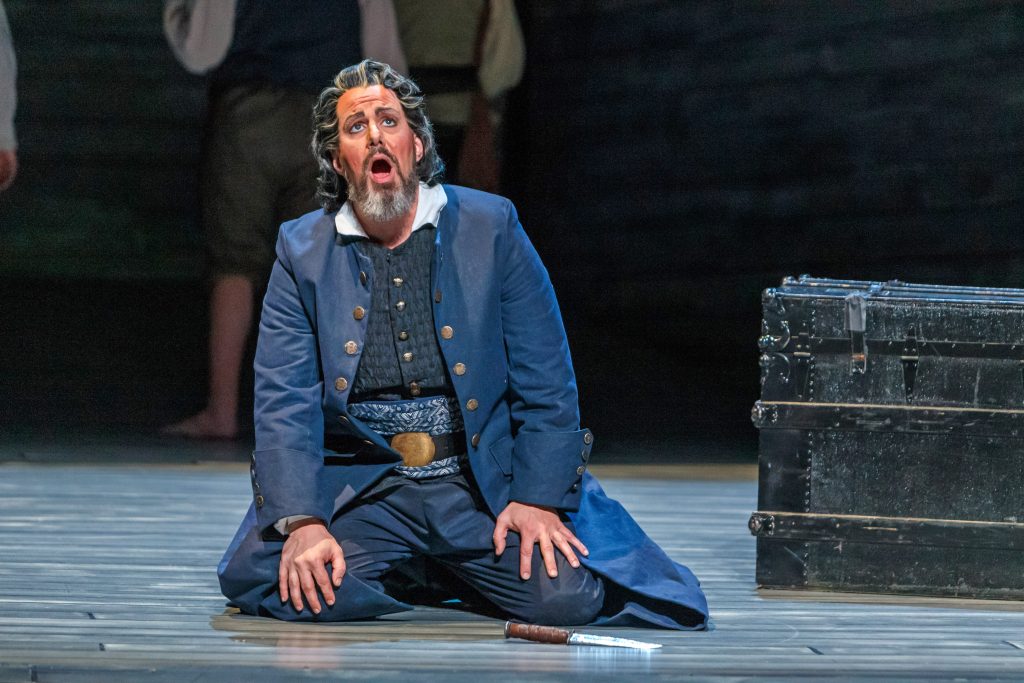
Kyle Albertson as The Flying Dutchman finds land and hope.
But that’s not why “The Dutchman,” one of Wagner’s earliest works, is still performed by premiere opera companies around the world. Just listening to his overture, a good ten minutes of leitmotifs (literally, leading themes which will be reprised later) beckons, begs, and wholly captures audience expectation. Here, well before the curtain rises, we hear the sea, we experience a storm approaching, we jump when thunderous waves crash ashore, we calm our souls as the clouds roll past, and we awaken to the human struggle of survival, love and honor. Wagner’s incredible “translation” of the sea has been mimicked, “covered,” and copied in countless seafaring film scores for decades. His overture alone is worth the price of admission.
By which effect, let us return to explore Wagner’s merits. He approached opera as a composer-conductor influenced heavily by Mozart, who famously wrote opera, and Beethoven, who wrote but one. Wagner believed that opera should aspire to greater heights by incorporating all elements of dramatic theater. By Wagner’s own term gesamtkunstwerk, he meant to create total works of art, balancing the contributions of his musical composition with character, action, conflict, catharsis—even with costumes and spectacular stagecraft––to achieve something greater than the sum of its parts. That said, however, none of Wagner’s works are appreciated more than for his powerful music. And that is decidedly so in this current production.
Debuts and Dedication
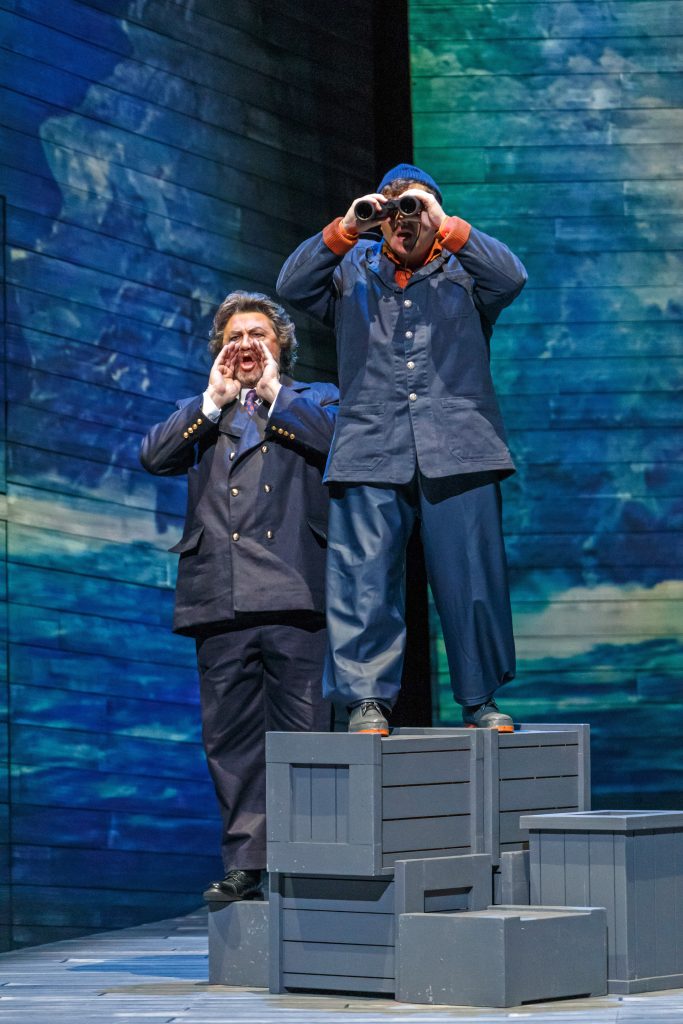
Peter Volpe, as Daland, and his Steersman, performed by Daniel O’Hearn, search for safer shores.
Mind you, Pittsburgh Opera’s talent is outstanding. Leading the cast as well as the story line is Captain Daland, performed by Peter Volpe, projecting the demanding role with an astounding vocal range, both baritone and bass, at one point hitting a note seemingly subterranean. He can act, too. Volpe is not shy in expressing his character’s dark moods or lofty ambition, in fact, in one scene he elicits a laugh or two for his appropriate antics. Daniel O’Hearn who performs the role of Steuermann, the ship’s steersman, is also remarkable. His rich tenor calms the sea, as well as his captain, to set the scene for the dramatic entrance of the famous Dutchman, both handsome and imposing. Performed by Kyle Albertson, looking every bit the part, the title character asserts his interest in meeting Daland’s daughter, Senta. Debuting in Pittsburgh with this production, Albertson is a Wagnerian artist through and through, having performed the composer’s many works in five seasons at the Met. And were it not for a last-minute health issue, the role of Senta might have been sung by Marjorie Owens, also to have debuted in Pittsburgh. Rather, flying in from Cape Town, South Africa, where she’d just finished competing in the 2023 Operalia competition, Alexandria Shiner commanded the stage, beginning rehearsals only three days before her debut. Quite evidently, Ms. Shiner is intimately familiar with Wagner’s works, and particularly this pivotal role. A strong soprano, she shattered audience expectations (the audience was informed of the last-minute substitution just prior to the overture) with the vocal agility the role demands.
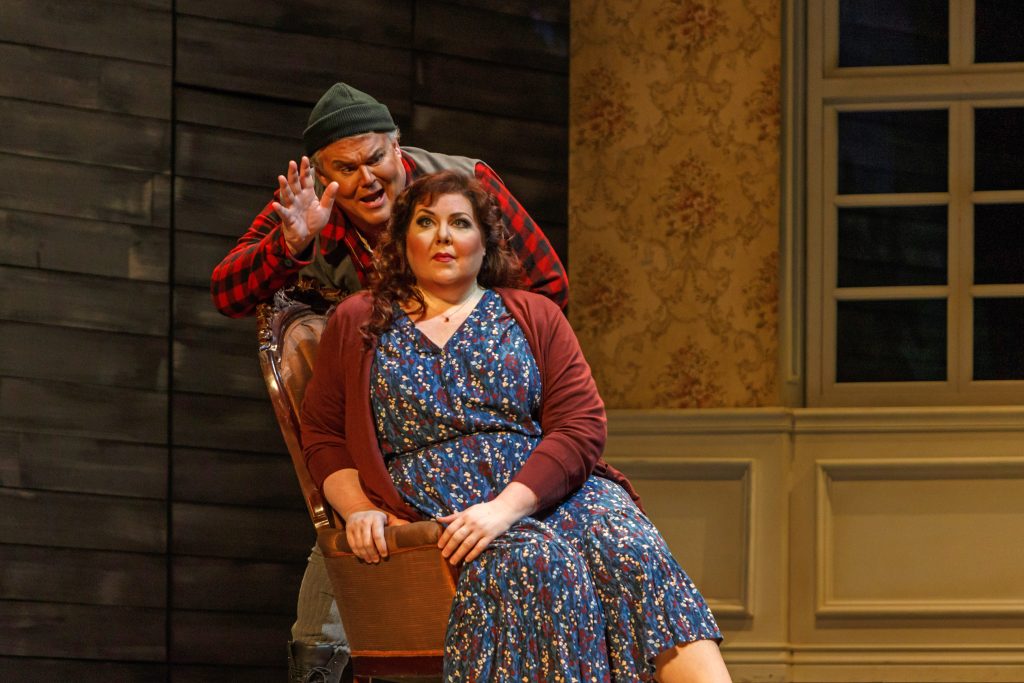
Erik, performed by Bryan Register, seeks the attention of Senta, played by Marjorie Owens (in rehearsal).
In the supporting roles of Mary, nurse to Senta, and Erik, Senta’s erstwhile love interest, are Leah Heater and Bryan Register. A fine mezzo-soprano, Heater is a resident alumna of the Pittsburgh Opera who will return to perform Flora this spring in La Traviata. Also debuting in Pittsburgh, Register is a highly accomplished tenor who will undertake leading roles elsewhere this season in two more Wagner works, specifically, Parsifal in Spain and Tristan und Isolde in Germany. A cast of maidens, spinning their fishing nets, Daland’s crew, attending to his storm ravaged ship, and the Dutchman’s ghostly sailors, lamenting their seafaring woes, are too many to list, but laudable credit is due their fine harmony and vocal support.
Without revealing the climax, the tale of this ancient legend is resolved with unexpected drama. The scene alone may have set Wagner’s early work as something quite innovative for its time. Suffice it to suggest that a bride’s commitment to remaining faithful may be both sweet and short.
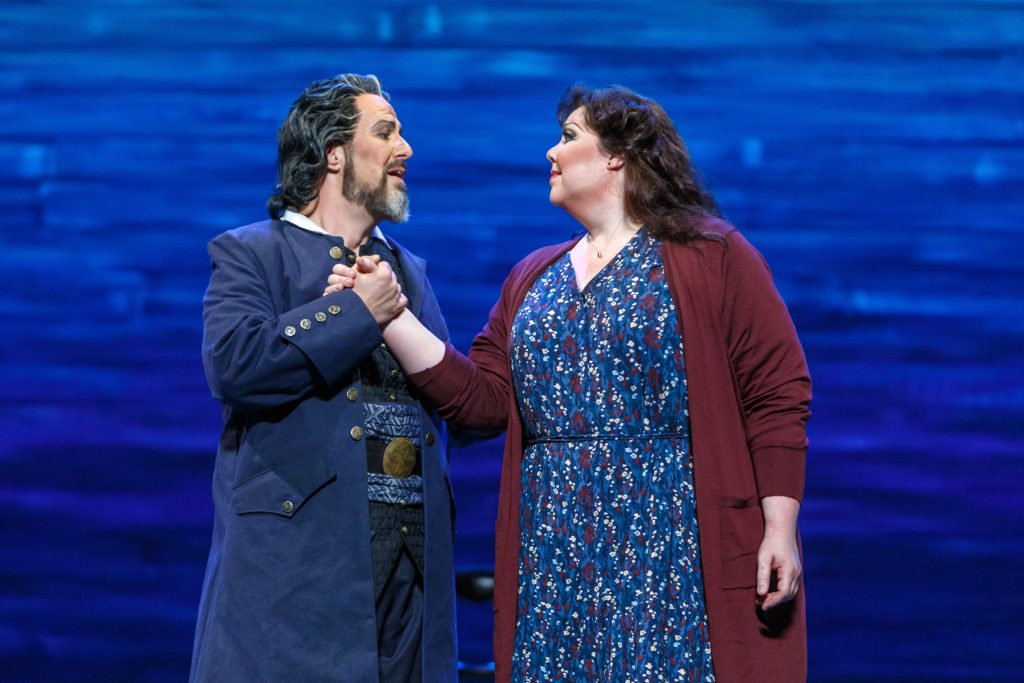
The Dutchman and Senta consummate their bonds.
Faith and Fidelity
Yet, if Wagner intended to create opera in which all the elements of good theater combine to support a single great work of art, this production falters in several distracting ways. There can be no fault if a director sets this ancient tale in more modern times, but some things seem out of kilter.
First off, to allay the expense of building a ghost ship (or at least part of one) on stage, this production employs modern technology. (Wagner, of course, would be amazed; so might an opera director just twenty years ago.) The set, constructed with appropriately Nordic-style batten walls, informs us with video projections that are sweeping and brilliant, but a bit confusing. Captain Daland’s ship is a modern, industrial tanker while the dutchman sails an ancient galleon with “black masts and blood red sails.” At best, the incongruity of scale is spooky. The Flying Dutchman, a legendary figure as old as time, banished by Satan to sail the seven seas, is idolized by Senta who stares and pines over his framed portrait hung prominently on a wall. But… is that a photograph? Likewise, when the village gathers for a picnic, any old crate, tub, or barrel would appear less jarring than red and blue Playmate-brand plastic coolers.
Bravos are nonetheless due the masterful orchestra and its conductor, Antony Walker, as well as the stage director, Sam Helfrich, and set designer, Steven C. Kemp. The visual projections were designed by Ian Wallace and costumes by Nancy Leary. Cindy Knight is the stage manager. Projection design is by Ian Wallace, lighting designer is Derek Van Heel, and James Geier is wig and makeup designer.
No matter the visual clues that help define this legendary tale, whether modern or classic, The Flying Dutchman is timeless. Kudos to the Pittsburgh Opera for bringing it back to life after a long absence.
Tickets for The Flying Dutchman are available at very reasonable prices for performances now through November 19 at the Pittsburgh Opera. Benedum Center, 237 7th Ave., Cultural District.
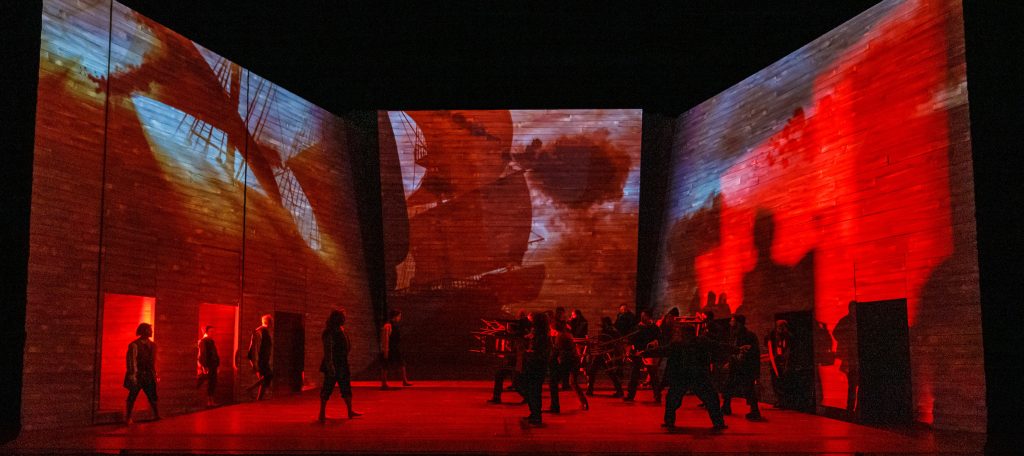
Pittsburgh Opera’s ‘The Flying Dutchman’ is a haunting love story with a dramatic score from Wagner.
Photos: David Bachman Photography for Pittsburgh Opera.
C. Prentiss Orr writes about theater for Entertainment Central. He has worked in theater management and has also taught theater.
Share on Social Media
Follow Entertainment Central
Latest Stories
Sign up for the EC Newsletter







